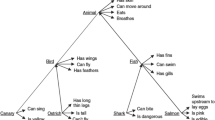Summary
In the acquisition phase of an incidental learning paradigm, words that are exemplars of categories were judged as to whether or not they belonged to a specified category. This was followed by a forced choice recognition task. The effects of three variables were studied: a) whether the acquisition task called for a positive or a negative response; b) the number of exemplar words per category; and c) whether distractor items in the recognition test came from the same category as the target words or from other categories. The results showed that recognition errors were influenced by all three variables. Unlike the variables a) and c) which showed significant main effects, the effect of number of exemplars per category was significant only for the same category distractor condition. In this condition more exemplars per category led to more recognition errors. The results are explained by assuming that retention performance is determined by two factors. The first factor is the distinctiveness of the memory traces. This is supposed to be a joint product of task-specific encoding and stimulus characteristics. The second factor is the distinctive similarity between the retrieval information and the stored memory traces. Although the results show some sublte effects that are not easy to explain, it is argued that this model offers a good account of the general findings.
Similar content being viewed by others
References
Baddeley AD (1978) The trouble with ‘levels’: A re-examination of Craik and Lockhart's framework for memory research. Psychol Rev 85:139–152
Battig WF, Montague WE (1969) Category norms for verbal items in 56 categories: A replication and extension of the Connecticut category norms. J Exp Psychol Monograph 80: no 3, part 2
Begg I (1978) Similarity and contrast in memory for relations. Mem Cognit 6:509–517
Craik FIM, Lockhart RS (1972) Levels of processing: a framework for memory research. J Verb Learn Verb Behav 11:671–684
Craik FIM, Tulving E (1975) Depth of processing and the retention of words in episodic memory. J Exp Psychol 104:268–294
De Groot AD (1965) Thought and choice in chess. Mouton, The Hague
Eysenck MW (1979) Depth, elaboration, and distinctiveness. In: Cermak LS, Craik FIM (eds) Levels of processing in human memory. Lawrence Erlbaum Associates, Hillsdale, NJ
Fisher RP, Craik FIM (1977) The interaction between encoding and retrieval operations in cued recall. J Exp Psychol Hum Learn Mem 3:701–711
Flexser AJ, Tulving E (1978) Retrieval independence in recognition and recall. Psychol Rev 85:153–171
Hunt RR, Elliott JM (1980) The role of nonsemantic information in memory: Orthographic distinctiveness effects on retention. J Exp Psychol Gen 109:49–74
Jacoby LL, Craik FIM, Begg I (1979) Effects of decision difficulty on recognition and recall. J Verb Learn Verb Behav 18:585–600
Johnson-Laird PN, Gibbs G, de Mowbray J (1978) Meaning, amount of processing and memory for words. Mem Cognit 6:372–375
Kirsner K (1974) Modality differences in recognition memory for words and their attributes. J Exp Psychol 102:579–584
Kolers PA, Ostry DJ (1974) Time course of loss of information regarding pattern analyzing operations. J Verb Learn Verb Behav 13:599–612
Light LL, Carter-Sobell L (1970) Effects of changed semantic context on recognition memory. J Verb Learn Verb Behav 9:1–11
Morris CD, Bransford JD, Franks JJ (1977) Levels of processing versus transfer appropriate processing. J Verb Learn Verb Behav 16:519–533
Moscovitch M, Craik FIM (1976) Depth of processing, retrieval cues, and uniqueness of encoding as factors in recall. J Verb Learn Verb Behav 15:447–458
Nelson DL (1979) Remembering pictures and words: Appearance, significance and name. In: Cermak LS, Craik FIM (eds) Levels of processing in human memory. Lawrence Erlbaum Associates. Hillsdale, NJ
Parkin AJ (1980) Levels of processing and the cue overload principle. Quart J Exp Psychol 32:427–434
Postman L, Thompkins BA, Gray WD (1978) The interpretation of encoding effects in retention. J Verb Learn Verb Behav 17:681–705
Shulman AI (1974) Memory for words recently classified. Mem Cognit 2:47–52
Stein BS (1978) Depth of processing re-examined: The effects of the precision of encoding and test appropriateness. J Verb Learn Verb Behav 17:165–174
Stein BS, Morris CD, Bransford JD (1978) Constraints on effective elaboration. J Verb Learn Verb Behav 17:707–714
Tulving E (1979) Relation between encoding specificity and levels of processing. In: Cermak LS, Craik FIM (eds) Levels of processing and human memory. Lawrence Erlbaum Associates, Hillsdale, NJ
Tulving E, Thomson DM (1973) Encoding specificity and retrieval processes in episodic memory. Psychol Rev 80:352–373
Tversky A (1977) Features of similarity. Psychol Rev 84:327–352
Watkins OC, Watkins MJ (1975) Buildup of proactive inhibition as a cue-overload effect. J Exp Psychol Hum Learn Mem 1:442–452
Wolters G (1982) Distinctiveness of processing, processing time and memory performance. Acta Psychologica (in press)
Author information
Authors and Affiliations
Rights and permissions
About this article
Cite this article
Wolters, G., Verduin, C.J. Retention performance as a function of the distinctiveness of memory traces and retention task. Psychol. Res 44, 257–267 (1982). https://doi.org/10.1007/BF00308424
Received:
Issue Date:
DOI: https://doi.org/10.1007/BF00308424




